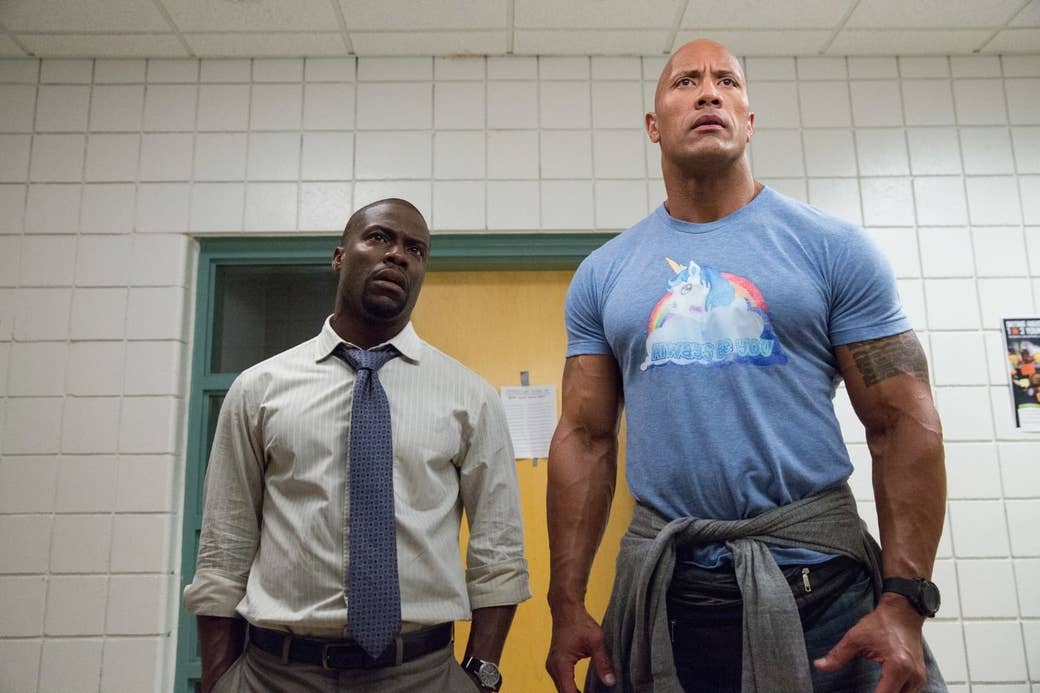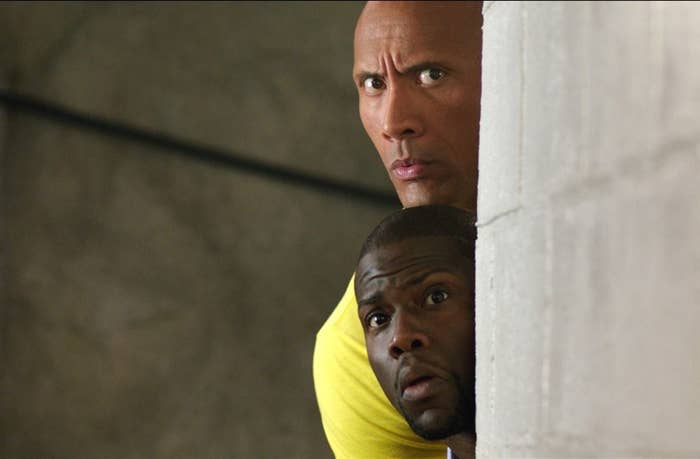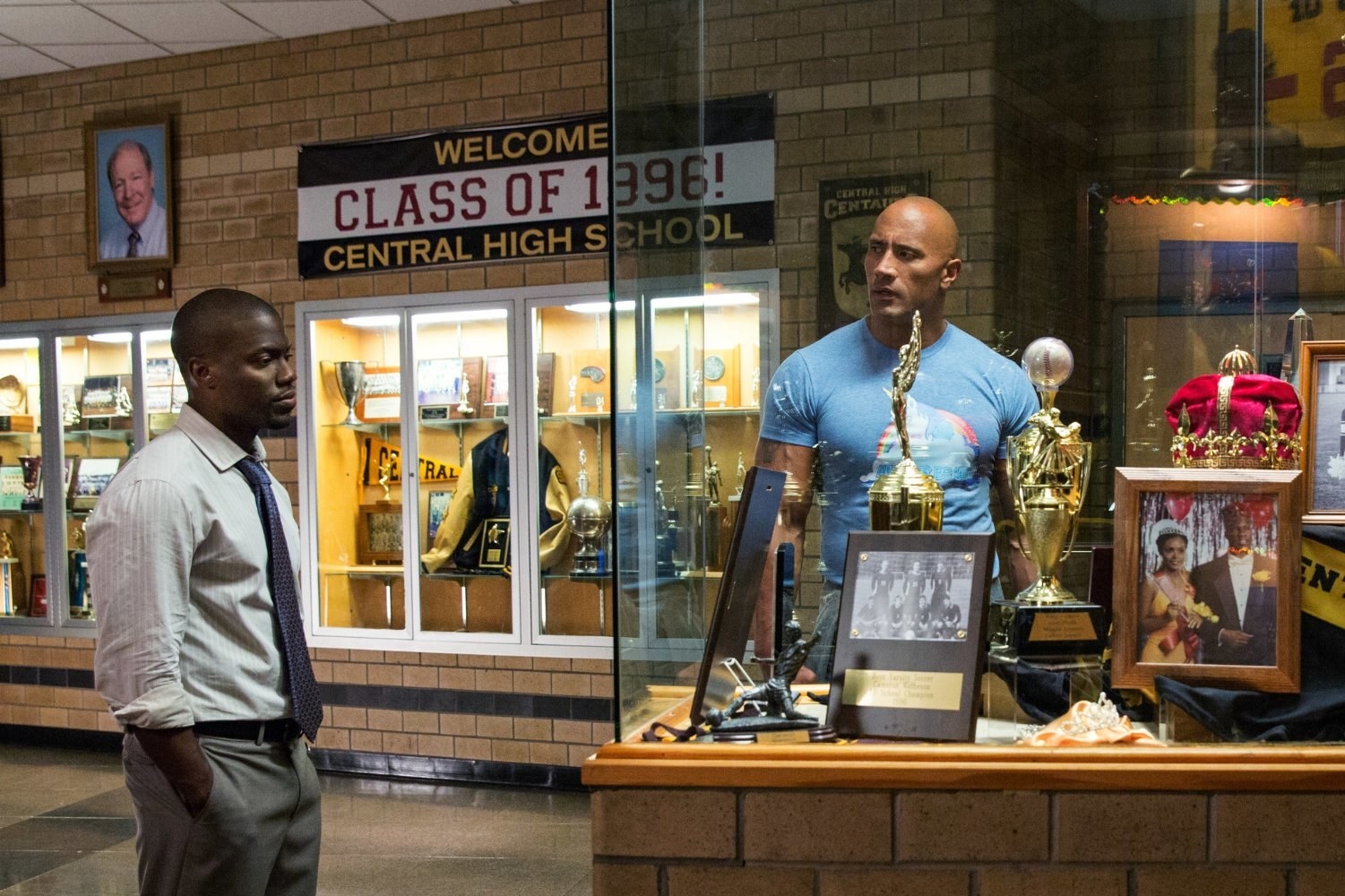
Dwayne "The Rock" Johnson plays a former fat kid in Central Intelligence. It makes for an obvious visual contrast — 20 years after bullied teenage outcast Robbie Weirdick (also played by Johnson, digitally smoothed and plumped up) was humiliated in front of his whole high school, he reappears, having changed his name to Bob Stone and transformed himself into a bulging upside-down triangle. The scenario could have been the ultimate look-at-me-now revenge, except that Johnson doesn't play the role with that sort of swagger. Bob is a CIA agent on the lam, and while he may be 90% brawn now, he's still a fanny pack–wearing, unicorn-loving oddball. He also continues to idolize Calvin Joyner (Kevin Hart), the former high school star who decades ago was kind to him in a difficult moment, and who, in present day, is chafing against his unexceptional adult life as a midlevel account.
Central Intelligence — which is directed by Dodgeball's Rawson Marshall Thurber off a script he wrote with The Mindy Project's Ike Barinholtz and David Stassen — is a sloppy, just-entertaining-enough comedy that keeps setting aside its more interesting reunion angst in favor of forgettably staged action. But the film has a firm grasp of Johnson's appeal as a leading man: He is Hollywood's most imposing ray of sunshine, a guy whose machismo is too cartoonish to be toxic; a dude who, rather than flaunting his muscles as a sign of superiority, presents them as an achievement that anyone can earn, if one commits to a regimen that includes crushing pre-dawn cardio and devouring several pounds of cod a day. Johnson shares the physique of a bulked-up star from the 1980s, but not the attitude. He's at his best when he seems in on the joke of how silly tough-guy posturing can look (like that time when he flexed so hard that he broke the cast on his arm and healed his broken bones through the sheer force of will in Furious 7).

And Johnson's unarguably in on the joke in Central Intelligence, as he wears Kevin Smith–worthy jorts and stuffs himself into a borrowed pajama set that strains at the seams. Bob is enthusiastically, deeply uncool, despite how he's reinvented himself as a professional badass. He doesn't regret the person he used to be so much as the harassment he used to endure. "I don't like bullies," he announces to a group of would-be thugs he dispatches at a bar. He responds to one of their slurs by noting "that's a lot of homophobia coming out of a very angry man" and advising therapy. His is not a duckling-to-swan story so much as it is a fantasy avenger tale for outcasts everywhere: He's a lovable, Sixteen Candles–worshiping dork who's been gifted with the skills of James Bond and the body of an action figure brought to life — and whose external overhaul hasn't erased his internal scars.
Johnson and Hart are a decent pairing, their size differential a joke unto itself, though the reliably funny Hart often seems a little aghast at his casting as the straight man, as he seized every opportunity he could for some physical comedy. He's saddled with Central Intelligence's scattered moments of jarring bro-ishness, though he fits in some memorable moments as he's dragged into the movie's mire of nostalgia mixed with nonsensical spy intrigue. Calvin's worried that he peaked in high school, until Bob gives him more pressing concerns by enlisting him as an unwilling sidekick, and the two avoid being arrested or shot. They end up on the run from a steely, possibly evil agent played by Amy Ryan, who insists that Bob is actually the untrustworthy party in this scenario. Central Intelligence turns over way too much time to its CIA storyline, and indulges in slack set pieces that are never quite crisp enough to work as action and never quite funny enough to come together as comedy.

The movie is inevitably stronger when it's dealing with the main characters' high school baggage, their former teenage selves casting long shadows over the thirtysomethings they've become. That's why the best scenes in the movie involve unbilled cameos during which some famous funny people turn up in the roles of Bob and Calvin's former classmates. As Bob's gone from heavy to burly and Calvin's stayed a little too steady, their former oppressors and crushes have done their own growing up, and the actors who play them fittingly contend with their onscreen images as nice guys or broad comediennes.
Central Intelligence (and every other high school reunion movie) suggests that we never really leave behind the people we were in high school, no matter how thoroughly we remake ourselves. But the movie's final moment of triumph, in which Bob revisits and redoes the worst moment of this life, is a poignant instance of self-love framed as an act of outrageousness. The movie begins with Johnson as a chubby teen, dancing to En Vogue by himself without a care, and comes back around to that moment in a way that makes the meaningless twists along the way worthwhile. Bob's journey is not about changing the way he looks but about reclaiming the freedom he used to have.
